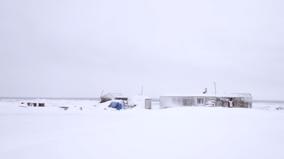New release
Coming
None
Le pays de la terre sans arbre ou le Mouchouânipi
1980
1 h 50 min
Leaving soon
Incorporant des séquences tournées au cours de trois expéditions menées sur une période de dix ans au Mouchouânipi, le vaste territoire ancestral du peuple innu, Pierre Perrault réalise un essai cinématographique sur la place centrale qu’occupe la chasse dans la culture et la cosmologie des Innus. À la différence des films qu’il signe en 1960 pour la série Au pays de Neufve France, dans laquelle les Innus ont très peu de possibilités de s’exprimer, ce documentaire sans narration est axé sur les interactions dynamiques entre les Innus et les archéologues et spécialistes des sciences sociales qu’ils accueillent. La direction de …

Details
Incorporant des séquences tournées au cours de trois expéditions menées sur une période de dix ans au Mouchouânipi, le vaste territoire ancestral du peuple innu, Pierre Perrault réalise un essai cinématographique sur la place centrale qu’occupe la chasse dans la culture et la cosmologie des Innus. À la différence des films qu’il signe en 1960 pour la série Au pays de Neufve France, dans laquelle les Innus ont très peu de possibilités de s’exprimer, ce documentaire sans narration est axé sur les interactions dynamiques entre les Innus et les archéologues et spécialistes des sciences sociales qu’ils accueillent. La direction de la photographie de ce film sorti en 1980 est assurée par Bernard Gosselin et le montage, par Monique Fortier, d’importantes figures du mouvement du cinéma direct au Québec.
« De 1960 à 1985, Alexis Joveneau, un missionnaire catholique belge de la congrégation cléricale des Oblats de Marie-Immaculée qui fut le curé des Montagnais de La Romaine (Innus d’Ulamen-Shipit) de 1953 à 1992, a participé à cinq films de l’ONF : Attiuk (1960), Ka Ke Ki Ku (1960), Le goût de la farine (1977), Le pays de la terre sans arbre ou le Mouchouânipi (1980) et La grande allure II (1985).
Depuis novembre 2017, des allégations d’agressions ont été portées contre M. Joveneau par des membres de la communauté de La Romaine pendant les audiences de l’Enquête nationale sur les femmes et les filles autochtones disparues et assassinées. Des enquêtes et articles journalistiques récents ont rapporté d’autres allégations d’agressions sexuelles, d’abus physiques, psychologiques ou financiers ayant fait des dizaines de victimes. Le 29 mars 2018, une demande d'action collective a été déposée contre les Oblats de Marie-Immaculée en Cour Supérieure (du Québec). Le 16 novembre 2021, l’action collective a été autorisée. Les Oblats visés par ces allégations sont entre autres Alexis Joveneau, Omer Provencher, Edmond Brouillard, Raynald Couture et Édouard Meilleur. »
« De 1960 à 1985, Alexis Joveneau, un missionnaire catholique belge de la congrégation cléricale des Oblats de Marie-Immaculée qui fut le curé des Montagnais de La Romaine (Innus d’Ulamen-Shipit) de 1953 à 1992, a participé à cinq films de l’ONF : Attiuk (1960), Ka Ke Ki Ku (1960), Le goût de la farine (1977), Le pays de la terre sans arbre ou le Mouchouânipi (1980) et La grande allure II (1985).
Depuis novembre 2017, des allégations d’agressions ont été portées contre M. Joveneau par des membres de la communauté de La Romaine pendant les audiences de l’Enquête nationale sur les femmes et les filles autochtones disparues et assassinées. Des enquêtes et articles journalistiques récents ont rapporté d’autres allégations d’agressions sexuelles, d’abus physiques, psychologiques ou financiers ayant fait des dizaines de victimes. Le 29 mars 2018, une demande d'action collective a été déposée contre les Oblats de Marie-Immaculée en Cour Supérieure (du Québec). Le 16 novembre 2021, l’action collective a été autorisée. Les Oblats visés par ces allégations sont entre autres Alexis Joveneau, Omer Provencher, Edmond Brouillard, Raynald Couture et Édouard Meilleur. »
-
directorPierre Perrault
-
producerPaul LaroseJacques Bobet
-
imagesBernard Gosselin
-
soundClaude BeaugrandSerge Beauchemin
-
editingMonique Fortier
-
sound editingAlain Sauvé
-
sound mixerJean-Pierre Joutel
-
musicPhilippe GagnonÉmile Grégoire
-
participationSerge-André CrêteAnne-Marie AndréDominique AshiniBasile BellefleurHenri CulosAlexis JoveneauJosé MaillotAndré Mark
Education
Ages 16 to 17
School subjects

















